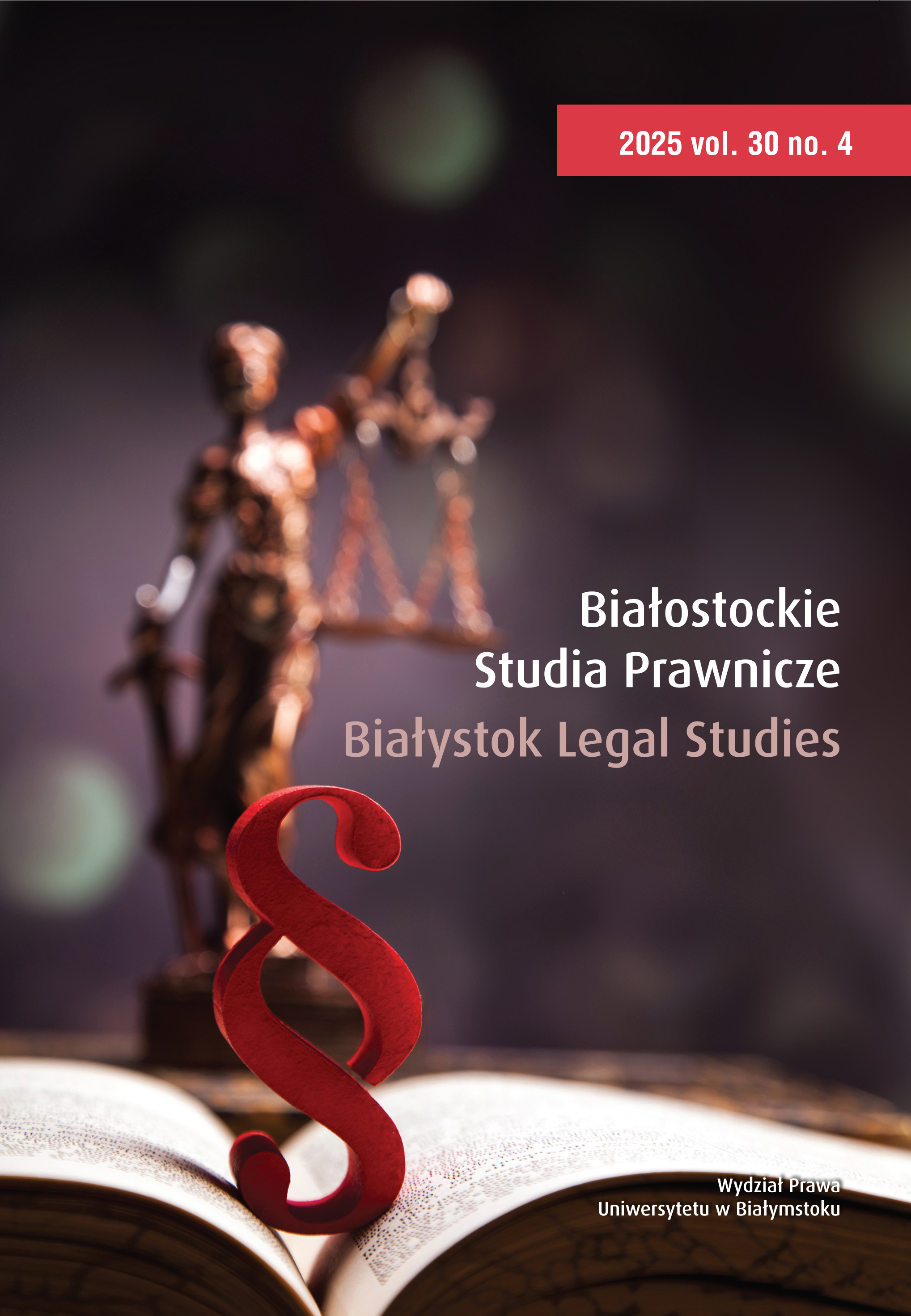Digital Coercion? The Financial Market and the Right to Digital Opt-Out between Fiction and Reality
Аннотация
This article examines the challenges that digitalisation poses for the regulation of contemporary financial markets and the implications for individual freedom. The financial sector demonstrates how ‘digital coercion’ can threaten the right not to use technology, raising questions about the balance between protecting citizens’ rights and enabling participation in a digitalised economy. The focus is on how technological development, especially artificial intelligence (AI), affects everyday interactions with financial systems and whether individuals still have a genuine choice to remain outside digital frameworks. The analysis relies primarily on the dogmatic-legal method, complemented by axiological reflection and critical legal perspectives, to reveal tensions between existing regulations, constitutional values and human rights. Digital coercion occurs when opting out of technology is no longer practically possible, particularly in finance where alternatives diminish as digital tools dominate. While it may be theoretically possible to avoid financial technology, doing so risks exclusion from essential functions such as accessing credit or managing finances. EU regulations like the AI Act, MiCA and DORA reinforce this process, promoting and effectively enforcing digitalisation while limiting the right to digital opt-out. Although these frameworks aim to safeguard privacy and freedom, in practice technologies and algorithms increasingly shape financial markets, often in opaque ways. In line with Lawrence Lessig’s notion that ‘code is law’, algorithms become de facto lawmakers, establishing norms that constrain free consumer choice. Consequently, the right not to use technology becomes largely illusory when access to fundamental services depends on technological infrastructure.Библиографические ссылки
Armour, J. (2016). The financial system. In J. Armour, D. Awrey, P. Davies, L. Enriques, H. J. Gordon, C. Mayer, & J. Payne (Eds.), Principles of financial regulation (pp. 22–50). Oxford University Press.
Bauman, Z. (2006). Płynna nowoczesność. Wydawnictwo Literackie.
Bilski, A. (2024). Blockchain i smart contracts w sektorze bankowym. In K. Szpyt (Ed.), FinTech. Nowe technologie w sektorze bankowym (pp. 35–52). C.H. Beck.
Boden, A. M. (2020). Sztuczna Inteligencja. Wydawnictwo Uniwersytetu Łódzkiego.
Bybee, J. K. (2016). How civility works. Stanford University Press.
Chłopecki, A. (2018). Sztuczna inteligencja – szkice prawnicze i futurologiczne. C.H. Beck.
Cyman, D. (2023). Public interest as a determinant of state influence on the financial market in the European Union. Studia Iuridica, 98, pp. 55–56.
Dolniak, P. (2024). Sztuczna inteligencja w wymiarze sprawiedliwości. In P. Dolniak, T. Kuźma, A. Ludwiński, & K. Wasik (Eds.), AI na styku prawa i cyfryzacji (pp. 79–107). Wolters Kluwer.
Dybiński, J. (2025). Wstęp. In J. Dybiński (Ed.), Prawo rynku finansowego. Prawo usług płatniczych. Komentarz Vol. XB. (pp. xiii–xiv). C.H. Beck.
European Banking Authority. (2020). EBA guidelines on loan origination and monitoring, EBA/GL/2020/06. https://www.eba.europa.eu/sites/default/files/document_library/Publications/Guidelines/2020/Guidelines%20on%20loan%20origination%20and%20monitoring/Translations/886690/Final%20Report%20on%20GL%20on%20loan%20origination%20and%20monitoring_COR_PL.pdf
European Banking Authority. (2021). EBA guidelines on internal governance, EBA/GL/2021/05.
European Banking Authority. (2025). EBA guidelines on ICT and security risk management, EBA/GL/2019/04. (Originally published 2019).
Engelen, E. (2008). The case for financialization. Competition & Change, 12(2), pp. 111–119.
European Commission. (2024, 10 June). Targeted consultation on artificial intelligence in the financial sector. https://finance.ec.europa.eu/regulation-and-supervision/consultations-0/targeted-consultation-artificial
intelligence-financial-sector_en
European Commission, Overview of digital finance. https://finance.ec.europa.eu/digital-finance/overview-digital-finance_en
European Parliament and European Council. (2015, 25 November). Directive (EU) 2015/2366 on Payment Services in the Internal Market, Amending Directives 2002/65/EC, 2009/110/EC and 2013/36/EU and Regulation (EU) no. 1093/2010, and Repealing Directive 2007/64/EC (Text with EEA Relevance) (PSD 2) (O. J. L 337, 23.12.2015).
European Parliament and European Council. (2016, 27 April). Regulation (EU) 2016/679 on the Protection of Natural Persons with Regard to the Processing of Personal Data and on the Free Movement of Such Data, and Repealing Directive 95/46/EC (General Data Protection Regulation) (Text with EEA Relevance) (O. J. L 119, 04.05.2016).
European Parliament and European Council. (2022, 14 December). Regulation (EU) 2022/2554 on Digital Operational Resilience for the Financial Sector and Amending Regulations (EC) no. 1060/2009, (EU) no. 648/2012, (EU) no. 600/2014 (EU), no. 909/2014 and (EU) 2016/1011 (DORA) (Text with EEA Relevance), PE/41/2022/INIT (O. J. L 333, 27.12.2022).
European Parliament and European Council. (2023a). Proposal for a Directive of the European Parliament and of the Council on Payment Services and Electronic Money Services in the Internal Market Amending Directive 98/26/EC and Repealing Directives 2015/2366/EU and 2009/110/EC, COM/2023/366 final (PSD 3).
European Parliament and European Council. (2023b). Proposal for a Regulation of the European Parliament and of the Council on Payment Services in the Internal Market and Amending Regulation (EU) no. 1093/2010, COM/2023/367 (PSR).
European Parliament and European Council. (2023c). Proposal for a Regulation of the European Parliament and of the Council on a Framework for Financial Data Access and Amending Regulations (EU) no. 1093/2010, (EU) no. 1094/2010, (EU) no. 1095/2010 and (EU) 2022/2554 (FIDA), COM/2023/360 final.
European Parliament and European Council. (2023, 31 May). Regulation (EU) 2023/1114 on Markets in Crypto-Assets, and Amending Regulations (EU) no. 1093/2010 and (EU) no. 1095/2010 and Directives 2013/36/EU and (EU) 2019/1937 (Text with EEA Relevance) (MiCA) PE/54/2022/REV/1 (O. J. L 150, 09.06.2023.
European Parliament and European Council. (2024, 31 May). Regulation (EU) 2024/1624 on the Prevention of the Use of the Financial System for the Purposes of Money Laundering or Terrorist Financing (AML/CFT) (Text with EEA Relevance), PE/36/2024/REV/1 (O. J. L 2024/1624).
European Parliament and European Council. (2024, 13 June). Regulation (EU) 2024/1689 Laying Down Harmonised Rules on Artificial Intelligence and Amending Regulations (EC) no. 300/2008, (EU) no. 167/2013, (EU) no. 168/2013, (EU) 2018/858, (EU) 2018/1139 and (EU) 2019/2144 and Directives 2014/90/EU (EU) 2016/797 and (EU) 2020/1828 (Artificial Intelligence Act) (Text with EEA Relevance), PE/24/2024/REV/1 (O. J. L 2024/1689).
European Union. (2012). Consolidated version of the treaty on the functioning of the European Union (O. J. C 326, 26.10.2012).
Fedorowicz, M. (2021a). Nadzór nad rynkiem kryptoaktywów w świetle projektu rozporządzenia MiCA – najnowsze wyzwania i tendencje regulacyjne cyfrowej stabilności i odpowiedzialności na rynku finansowym UE. In K. Królik-Kołtunik & I. Skibińska-Fabrowska (Eds.), Inwestycje alternatywne – nowe spojrzenie, (pp. 75–88). CeDeWu.
Fedorowicz, M. (2021b). Znaczenie soft law EBA dla określania normatywnego standardu ochrony konsumenta na rynku finansowym. Internetowy Kwartalnik Antymonopolowy i Regulacyjny, 10, Article 7, pp. 21–34.
Fedorowicz, M., & Zalcewicz, A. (2024). Challenges posed to the EU financial market by the implementation of the concept of sustainable financing. Bialystok Legal Studies, 29, pp. 54–56.
Footer, R. M. (2020). The EU’s engagement with business on human rights. In J. Wouters, M. Nowak, A. L. Chané, & N. Hachez (Eds.), The European Union and human rights: Law and policy (pp. 312–344). Oxford University Press.
Gromski, W. (2007). Law and economics jako teoria polityki prawa. In J. Stelmach & M. Soniewicka (Eds.), Analiza ekonomiczna w zastosowaniach prawniczych (p. 51). Wolters Kluwer Polska.
Huxley, A. (1946). Brave new world. Harper Crest.
Jędrzejczak, M. (2024). Protection of personal data processed in artificial intelligence systems. Gdańskie Studia Prawnicze, 64, Article 3, pp. 88–89.
Jóźwicki, W. W., & Szoszkiewicz, Ł. (2025). Non-use of the internet as human rights enabler? The curious cases of the right to privacy and the right to health. In D. Kloza, E. Kużelewska, E. Lievens, & V. Veerdoodt (Eds.), The right not to use the internet: Concept, contexts, consequences (pp. 106–120). Routledge Początek formularza.
Jurkowska-Zeidler, A. (2008). Bezpieczeństwo rynku finansowego w świetle prawa Unii Europejskiej. Wolters Kluwer Polska.
Jurkowska-Zeidler, A. (2011). Nowa globalna architektura finansowa. Gdańskie Studia Prawnicze, 25, pp. 535–547.
Kloza, D., Kużelewska, E., Lievens, E., & Veerdoodt, V. (Eds.). (2025.) The right not to use the internet: Concept, contexts, consequences. RoutledgePoczątek formularza.
Kowalewska, E., & Musiał, M. (2025). Accessibility of mobile banking apps in Poland: A legal analysis of recent developments. Przegląd Ustawodawstwa Gospodarczego, 3, pp. 27–35.
Krizhevsky, A., Sutskever, I., & Hinton, E. G. (2017). ImageNet classification with deep convolutional neural networks. Communications of the ACM, 60(6), pp. 84–90.
Kusak, M. (2022). Quality of data sets that feed AI and big data applications for law enforcement. ERA Forum, 23, pp. 209–219.
Kużelewska, E. (2025). Non-use of digital technologies and regulation. https://bsp.uwb.edu.pl/libraryFiles/downloadPublic/8
Lessig, L. (1999). Code and other laws of cyberspace. Basic Books.
Mariański, M. (2024). Reflections on the possible application of Rome I Regulation to obligations related to crypto-assets. Ruch Prawniczy, Ekonomiczny i Socjologiczny, pp. 24–28.
Masłowski, M. (2024). Otwarta bankowość. C.H. Beck.
Nieborak, T. (2016). Creation and enforcement of financial market law in the light of the economisation of law. Wydawnictwo Naukowe UAM.
Nowakowski, M. (2020). Fintech: Technologia, finanse, regulacje. Praktyczny przewodnik dla sektora innowacji finansowych. Wolters Kluwer.
Nowakowski, M. (2023). Sztuczna Inteligencja: Praktyczny przewodnik dla sektora innowacji finansowych. Wolters Kluwer.
Roukny, T. (2022). Decentralized finance: Information frictions and public policies. Approaching the regulation and supervision of decentralized finance. Publications Office of the European Union.
Rutkowska-Tomaszewska, E. (2020). Prawo ochrony konsumenta usług finansowych w świetle założenia racjonalnego ustawodawcy – kilka wybranych uwag. Przegląd Prawa i Administracji, 120, pp. 481–498.
Rutkowska-Tomaszewska, E., & Gałązka, P. (2024). The role of European supervisory authorities in consumer protection standard setting on the financial services market: Based on the example of the European Banking Authority. Studies in European Affairs, 28(2), pp. 223–232.
Smolak, M. (2001). Jak prawo łączy się ze światem? Uwagi na marginesie książki W. Gromskiego, Autonomia i instrumentalny charakter prawa. Ruch Prawniczy, Ekonomiczny i Socjologiczny, 3, pp. 191–198.
Stacewicz, P. (2023). O światopoglądowym oddziaływaniu informatyki w świecie współczesnym. In A. Zalcewicz & R. Kędziora (Eds.), Nowe technologie. Wartości, prawa, zasady (pp. 305–314). Politechnika Warszawska.
Szoszkiewicz, Ł. (2021). Dostępność danych w czasach sztucznej inteligencji a prawa człowieka w dziedzinie nauki. Wydawnictwo INP PAN.
Szoszkiewicz, Ł., & Świergiel, R. (2018). Financial institutions and the protection of individuals’ autonomy: A human rights perspective. Roczniki Nauk Prawnych, 28(4), pp. 125–136.
Szpringer, W., & Szpringer, M. (2014). Nowe zjawiska w regulacji rynku usług płatniczych (wybrane problemy na tle projektu noweli do dyrektywy PSD). ‘e-mentor’, 56(4), pp. 73–83.
Thaler, R. H., & Sunstein, C. R. (2009). Nudge: Improving decisions about health, wealth and happiness. Penguin Books.
United Nations. (1948). Universal declaration of human rights. https://www.un.org/sites/un2.un.org/files/2021/03/udhr.pdf
Zalcewicz, A. (2016). Teoretycznoprawne wprowadzenie w problematykę rynku usług płatniczych – kilka uwag tytułem wstępu. In A. Zalcewicz & B. Bajor (Eds.), Ustawa o usługach płatniczych. Komentarz (pp. 19–28). Wolters Kluwer.
Zalcewicz, A. (2023). New technologies in the control of public finances and building public confidence in the state. Bialystok Legal Studies, 28(2), pp. 23–25.
Ziętek, A. (2013). Jean Baudrillard wobec współczesności: polityka, media, społeczeństwo. Universitas.



